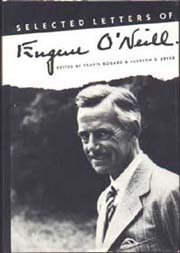![]()
 |
Selected Letters of Eugene O'Neill
Bogard, Travis and Bryer, Jackson R. (eds) |
| From C. Rollyson - Choice This is the finest collection of O'Neill letters to date. It does not supersede 'Love and Admiration and Respect': The O'Neill-Commins Correspondence {BRD 1987} or 'As Ever, Gene': The Letters of Eugene O'Neill to George Jean Nathan {BRD 1988}, but it does provide the fullest and most succinct portrayal of O'Neill as private man and playwright. Bogard and Bryer have combined their considerable biographical, bibliographical, and critical expertise to present what is, in some ways, a new O'Neill. They quite rightly claim to have documented a personality that was far more varied--more cheerful and involved with the world--than has been shown in biographies emphasizing his gloomy, tragic view of life. . . . An essential volume. From Library Journal Dramatist Eugene O'Neill was an intensely private man, and this 1989 collection of 600 selected letters offers a rare glimpse into his secluded life. The volume is divided into chronological sections, each beginning with a biographical essay by editors Bogard and Bryer that puts the events of the letters into better perspective. The text is highlighted by several black-and-white photographs. O'Neill's importance to American drama makes this essential for serious literature collections. From Arthur Miller - The New York Times Book Review {This volume}, edited by Travis Bogard and Jackson R. Bryer, who previously edited the letters of O'Neill to Macgowan (Mr. Bogard is also the editor of the 'Complete Plays' of Eugene O'Neill in the Library of America series), is a collection of nearly 600 of his letters, many published for the first time. The volume could once again make his life and work instructive to a generation that needs the example of his integrity and grit, his vision and undying belief in what he called an art theater (something his Provincetown Playhouse ceased to be after a time). . . . These letters confound a number of orthodox attitudes toward O'Neill's so-called unsophistication. In fact, he read widely, he knew Chinese and German philosophy, he began a serious study of ancient Greek, and he was far from being an inept writer of prose. Nor did he keep disdainfully apart from his peers. . . . Despite the 50-year period that these letters cover, a unity in O'Neill's life strikes the reader; from the beginning he had a fabulous appetite for greatness. From David Lan - New Statesman & Society My single most striking discovery in this selection of letters was the detailed description of not only the plot but also the whole structure of feeling of Long Day's Journey into Night {BRD 1956} (completed around 1941) in a series of letters written in mid-1920. . . . These letters, taken as a whole, express the same overriding themes as the plays. Here the commercial world is the world of getting plays on. A good third of the letters are shameless, often glorious self-promotions sent to the famous producers and critics of the day. The bulk of the rest are to his children and to his three successive wives. Only in the letters to or about these women does the writing achieve any emotional edge or depth. . . . Full though they are of odd revealing snippets ('Yes, that Fats Waller Your Feet's Too Big is a very, very beautiful thing!'), these letters contain almost nothing of the writer as artist, of the craftsman struggling with his tools. Here rather is the writer as salesman, as husband, as father, as the leading characters, that is, of his 40-odd plays. From Paul Gray - Time O'Neill's reputation has moved steadily away from the footlights toward reading lamps, a process that began during his lifetime. That, at least, is one of many conclusions to be drawn from {this volume}. . . . The result is a fragmented but fascinating autobiography that shows its subject growing disillusioned with the theater even while he was furiously engaged in expanding its possibilities. . . . Ironically, O'Neill's personality, as revealed in his letters, seems unsuited to the collaborative demands of the theater. His private visions lashed him forward, but he was nearly always disappointed with what he finally saw onstage. He grew increasingly frustrated by 'the inevitable compromises and distortions of production.' In 1934, the Nobel Prize still two years away, he wrote a friend: 'I take my theatre too personally, I guess--so personally that before long I think I shall permanently resign from all production and confine my future work to plays in books for readers only.' From Publisher's Weekly Perhaps the most surprising feature of this selection from O'Neill's voluminous correspondence, being published on the centenary of his birth, is that a writer with so intensely private an inner world should have poured so much exuberant imagination into his letters to relatives and friends. Divided into chronological sections, each preceded with a useful biographical essay, the letters span some 50 years. There is the voracious reader, budding playwright and ardent romantic; the mature artist in the full flood of his creativity; and finally the Nobel laureate beset by illness and family tragedy. We see O'Neill pouring out his feelings to his three wives (love turning to hatred in the case of the second), storming at his grown children, answering his critics, battling the tax collector, striving not always successfully to keep his inner and outer lives in balance. The letters abound in observation, irony, vitality and insights into the mind and heart of America's premier playwright. They also provide a salutary corrective to the gloomy O'Neill of legend. Bogard is professor emeritus at UC Berkeley, Bryer is a professor at the University of Maryland. Photos. |
|
© Copyright 1999-2007 eOneill.com |